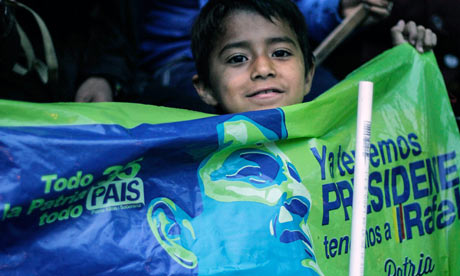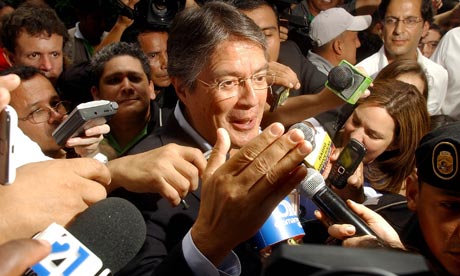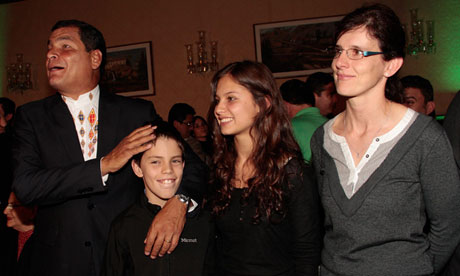Ecuador's president has vowed to deepen the "citizens' revolution" that has lifted tens of thousands of people out of poverty.
"In this revolution the citizens are in charge, not capital," said Rafael Correa, who was elected to a third term in office after winning 56.9% of the vote on Sunday.
His closest challenger, banker Guillermo Lasso, won 23.8% and former president Lucio Gutiérrez finished third with 6%, with 57% of the ballots counted. The remainder of the votes were divided among five other candidates.
Correa, a leftwing economist, has brought stability to the oil-exporting nation of 14.6 million people, which had seen seven presidents in the decade before he took office. With the help of crude prices hovering around $100 a barrel, he has raised living standards and widened the welfare state with region-leading social spending.
 A child celebrates Rafael Correa's election victory
The 48-year-old dedicated his victory to his cancer-stricken friend
Hugo Chávez, the Venezuelan president, whom some analysts have suggested
he could succeed as the standard bearer of Latin America's left. "We
are only here to serve you. Nothing for us; everything for you," Correa
told cheering supporters from the balcony of the Carondelet presidential
palace shortly after polls closed.
A child celebrates Rafael Correa's election victory
The 48-year-old dedicated his victory to his cancer-stricken friend
Hugo Chávez, the Venezuelan president, whom some analysts have suggested
he could succeed as the standard bearer of Latin America's left. "We
are only here to serve you. Nothing for us; everything for you," Correa
told cheering supporters from the balcony of the Carondelet presidential
palace shortly after polls closed.Yet he has also drawn wide condemnation for intolerance of dissent, and some analysts have questioned how sustainable his economic policies are. The number of government workers ballooned from 16,000 to 90,000 during Correa's previous term in office, an Ecuadorean thinktank reported in December.
Michael Shifter, president of the Inter-American Dialogue thinktank, described Correa's policy of increased social spending as "simply applying the standard recipe for many populist governments in the region". While his policies had succeeded in building political support in the short term, he added, it was not clear whether they would be sustainable.
While Correa has been heralded by supporters as the "undisputed rhetorical leader of Latin America's left", and should see his standing enhanced there, Shifter said the president's consolidation of power had damaged Ecuador's "already precarious institutions". Correa, he added, lacked the clout, ambition and coffers to build a coalition that could curtail US power in the region.
 Opposition candidate Guillermo Lasso talks to the press
His election victory easily surpassed the 51.7% he won in his first
re-election in April 2009. Under the rules of the constitution Correa is
barred from competing for another four-year term.
Opposition candidate Guillermo Lasso talks to the press
His election victory easily surpassed the 51.7% he won in his first
re-election in April 2009. Under the rules of the constitution Correa is
barred from competing for another four-year term.Ecuador relies on petroleum for more than half its export earnings, and Correa has used this oil wealth to make public education and healthcare more accessible and lay thousands of miles of highways.
Foreign investment has suffered, however, and Lasso, the former head of the Banco de Guayaquil, ran his election campaign on a promise to give multinational businesses more favourable terms, such as abolishing a 5% tax on capital removed from Ecuador.
Correa said he was happy to have more foreign investment but "it's better not to have it than to mortgage the country in the name of that pipe dream called foreign investment". He did not explain how he planned to pay for efforts to "quicken and deepen" poverty reduction. Sceptical economists say the state cannot afford it without major new revenue sources.
Such talk has not dimmed public enthusiasm for Correa. Jomaira Espinosa, 18, who voted for him on Sunday, said: "Before Correa, my family didn't have enough to eat." She said her father, who had struggled to find work, had recently been hired as a public servant, while she hoped to go to university for free with assistance from Correa's education initiatives.
Since he took office in 2007, Ecuador's poverty rate has dropped nearly five percentage points to 32.4%, according to the UN, and some 1.9 million people receive $50 a month in aid from the state.
However, critics say the handouts and subsidies have bloated the government and civil liberties, meanwhile, have suffered.
Correa has been widely condemned for using criminal libel law against opposition news media and for such strongarm tactics as seizing Ecuador's airwaves to attack opponents.
German Calapucha, a 29-year-old accountant, said he had voted against Correa because he was tired of the president's imperiousness. "He thinks that because he wins elections he has the right to mistreat people," Calapucha said.
 Correa with his children, Miguel and Anne, and wife, Anne Malherbe. Photograph: EPA
Correa has eroded the influence not just of opposition parties but
also of the Roman Catholic church and independent news media. He has
prosecuted indigenous leaders for organising protests against his
attempt to open up Ecuador to large-scale mining without their consent.
Meanwhile, he has been unable to stop a growing sense of vulnerability
in a country where robberies and burglaries soared 30% in 2012 compared
with the previous year.
Correa with his children, Miguel and Anne, and wife, Anne Malherbe. Photograph: EPA
Correa has eroded the influence not just of opposition parties but
also of the Roman Catholic church and independent news media. He has
prosecuted indigenous leaders for organising protests against his
attempt to open up Ecuador to large-scale mining without their consent.
Meanwhile, he has been unable to stop a growing sense of vulnerability
in a country where robberies and burglaries soared 30% in 2012 compared
with the previous year.Correa, a University of Illinois graduate, gained an early reputation as a maverick, defying international financiers by defaulting on $3.9bn in foreign debt obligations and rewriting contracts with oil multinationals to secure a higher share of revenues for Ecuador.
He has kept the US at arm's length, and angered Britain and Sweden in August by granting asylum at the Ecuadorean embassy in London to WikiLeaks founder Julian Assange, who is wanted for questioning in Sweden over sexual assault allegations.
Meanwhile, Correa has courted Iran and China. The latter is the biggest buyer of Ecuador's oil and holds $3.4bn in Ecuadorean debt, according to the finance minister, Patricio Rivera.
No comments:
Post a Comment